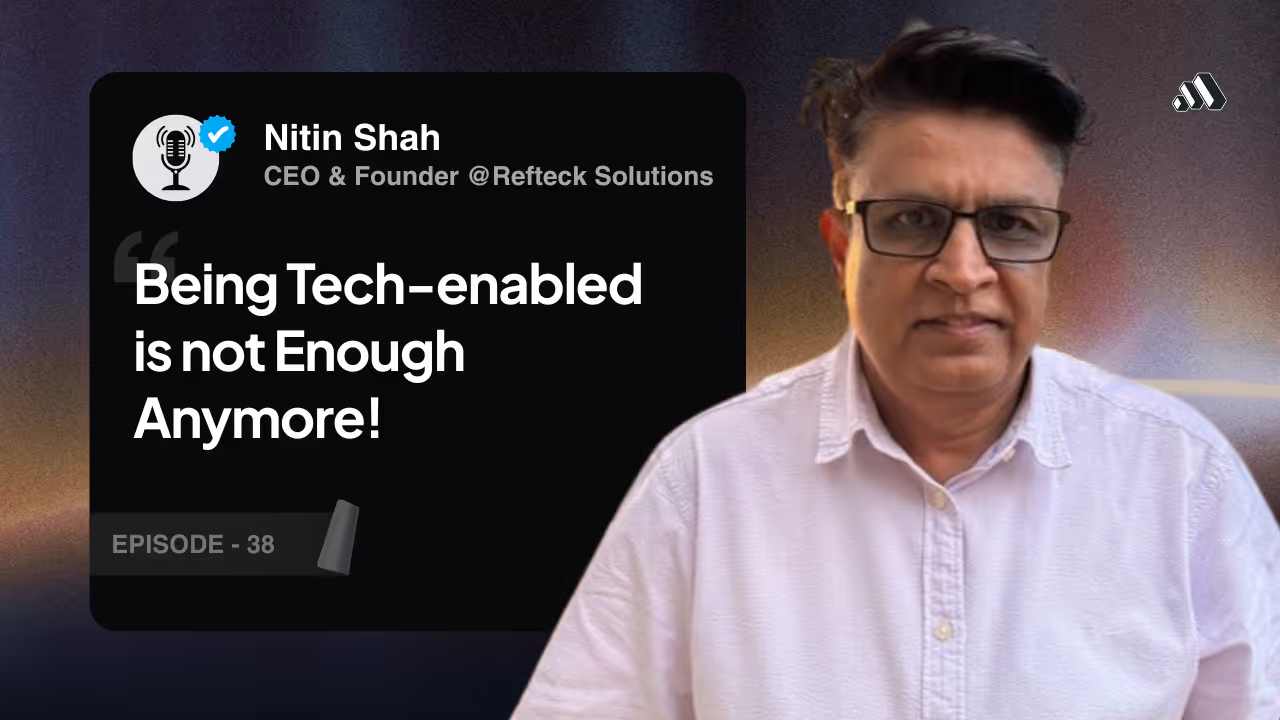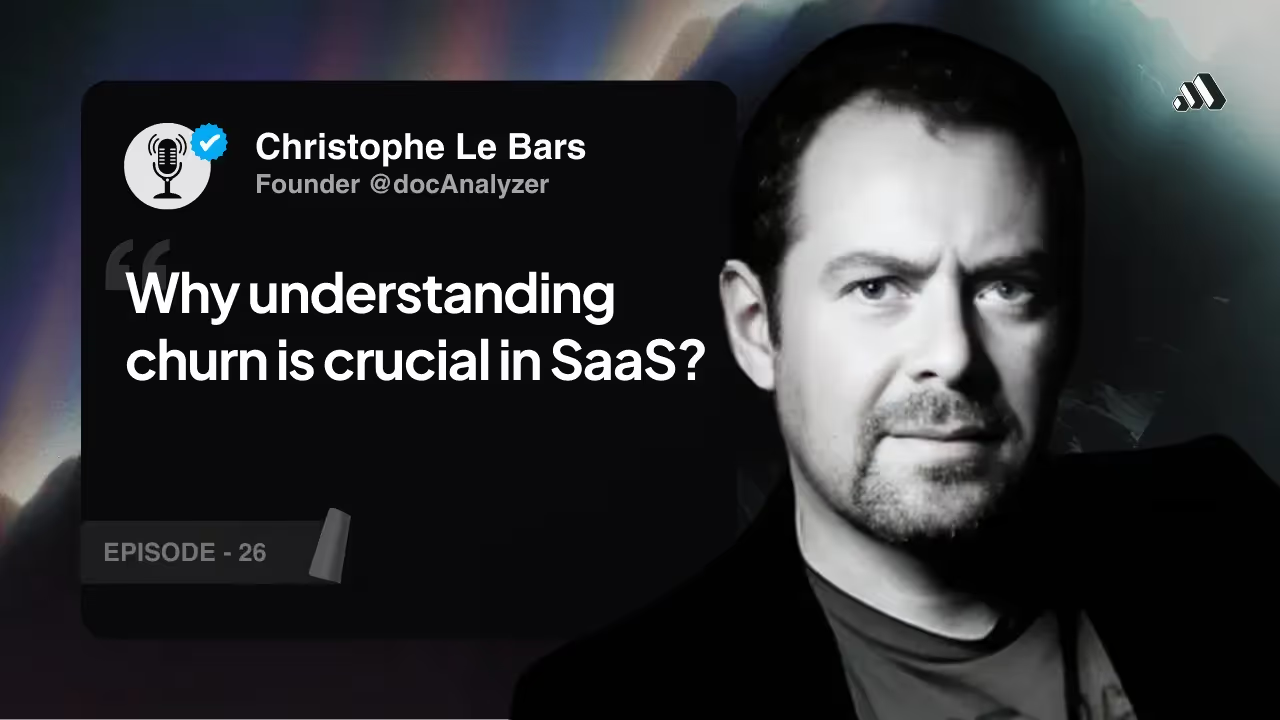Hire Fast, Fire Faster, Promote Fastest - Why Josh follows this?
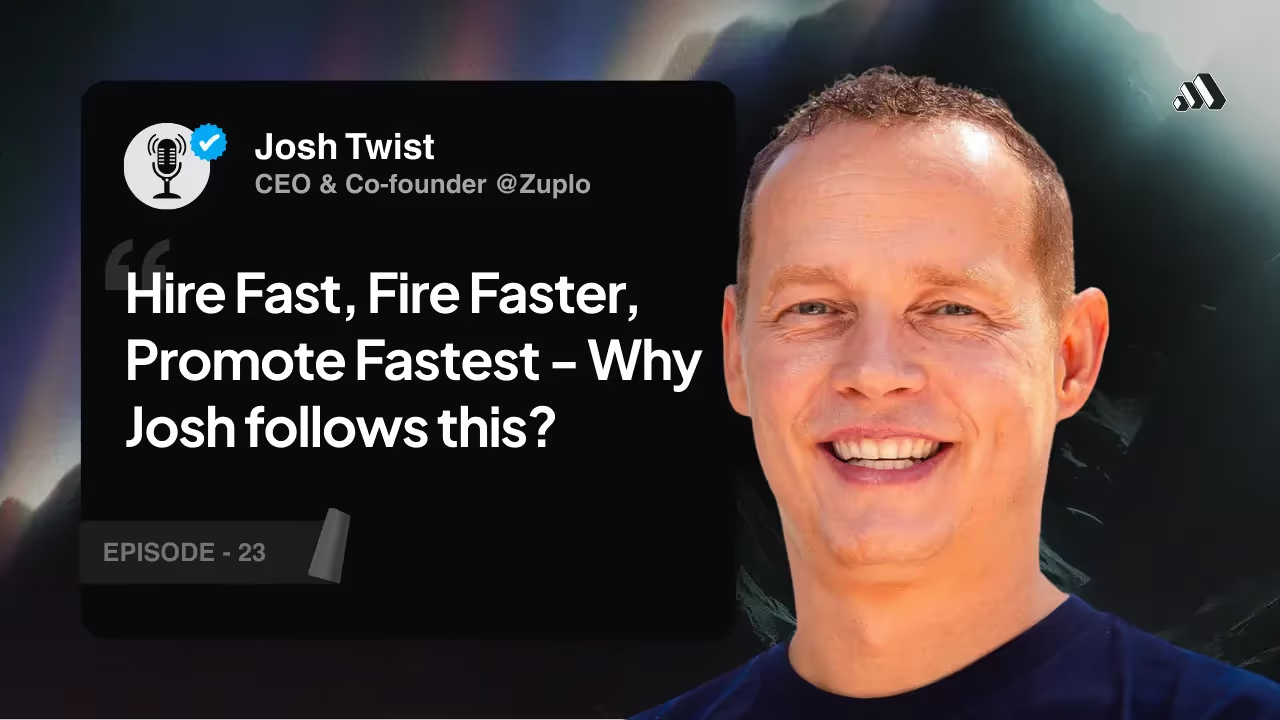



.avif)
Introduction
In this episode of Building Momentum, host Yash speaks with Josh from Zuplo, a company transforming API management. They discuss the challenges of launching APIs, the importance of building a strong team culture, and the strategies for pricing and marketing in a competitive landscape. Josh shares insights on balancing customer needs with product vision and the significance of focusing on small businesses to drive enterprise sales. The conversation also touches on leadership challenges and the evolving nature of startup growth.
"If you use Zuplo, you choose Zuplo."
- Josh Twist
Key Takeaways
- Zuplo helps businesses launch high-quality APIs quickly.
- The importance of a small, skilled team for productivity.
- Zero churn indicates strong customer satisfaction.
- Building for small businesses can lead to enterprise success.
- Pricing strategies should reflect the value delivered to customers.
- Effective marketing requires internal content generation.
- Balancing founder involvement is crucial for team efficiency.
- Customer feedback should align with the product vision.
- Aggressive marketing can differentiate a product in a crowded market.
- Continuous iteration on pricing is necessary for success.
Transcript
Yash From Momentum (00:00)
Hello and welcome back to Building Momentum, the show where we peel back the curtain on the exciting and often chaotic world of building a successful technology business. I'm Yash, your host for this show, where every episode we bring you the stories and strategies of people who've been in the trenches, conquering churns, scaling their teams, and building products that people and businesses love. In this episode, we'll be chatting with Josh from Zuplo. Zuplo is reinventing API management by helping you add authentication, rate limits,
analytics, and developer documentation to your APIs in minutes. We're excited to hear their story and the lessons they've learned along the way. We'll be dissecting the wins, the losses, and everything in between. So buckle up, grab your headphones, and get ready to dive in the world of building digital products. Hey, Josh. Thank you for joining us today. How are you doing?
Josh (00:46)
I'm doing great. Nice to meet you, Yash. Thanks for having me on the podcast.
Yash From Momentum (00:51)
Awesome. Thank you again for joining us and let's start with this. Let's start with what's the big bad problem that exists in the world that you're trying to fix with Zuplo.
Josh (01:01)
Yeah, when folks, any business today is becoming an API business, right? Whether you're Stripe that is what we call API first, like their whole business is done through APIs, or you're Shopify which needs APIs, or any business today needs APIs. And going from understanding what your API needs to do from a business perspective in terms of the problem it needs to solve, there is a lot of other things you've got to do to launch an API that frankly,
you shouldn't be building. Like, don't build your own API authentication, don't build your own API rate limiting, don't build your own developer documentation, don't build your own monetization system and quotas and the long list of things that Zuplo helps you do. So the way we think of what Zuplo is doing is you go from the notion of I want to launch an API to share with businesses or, you know, consumers or developers. You want to do it like a craftsman because all engineers are crafts people.
and you want to launch something that has a high quality experience. You want to be as good as Stripe. Stripe is still considered the gold standard. So you can kind of think of Zuplo as like Stripe in a box. We will get you from a basic API to a Stripe quality API experience. I don't know about five minutes, but honestly, I have deployed customers from decision to production in two hours, which I think is pretty fast. So that's kind of the problem we solve, and we solve it for...
Yash From Momentum (02:20)
Wow, that is extremely fast.
Josh (02:24)
Startups we have lots of YC like Y Combinator companies that use Zuplo but we also have giant enterprises that trade on the Fortune 500 and you know that are a strike at sorry API first companies similar to stripe etc like Block Demon in the crypto world and we just take them to that high quality experience very very
Yash From Momentum (02:42)
problem that you mentioned, we've actually, I discovered Zuplo while I reached out to you. And that's interesting because we starting to use it at Momentum as well when we deployed. For my previous company was the SaaS company called ClientJoy, which is where we did all of those things. We had rate limiting, we were doing API documentation. We did all of those things and we were doing it at Momentum as well for our clients. And while we reached out, we discovered this and so it's sort of being set up for our first.
Josh (02:52)
cool.
All right.
Yash From Momentum (03:12)
client of first project that we're building. interesting. The other piece, yeah. Yeah, no, absolutely. customers, mean, all ABC, right? So always be closing. So just the fact that you said yes, sort of looked at what you're building in terms of while I was doing the research, found it to be valuable for the company, sent it out to our head of engineering who has nothing to do with the podcast, but sent it out to him. Hey, know, is this useful? This sounds like something that we do.
Josh (03:16)
I didn't know that. That's fantastic. I didn't expect to find a customer in doing a podcast, but I'll take it. You're all welcome.
Yash From Momentum (03:41)
And this seems like something that will help us not to do that. And so it is helpful.
Josh (03:47)
I don't think I got a better plug in the Yash than that, so thank you very much, that's awesome.
Yash From Momentum (03:52)
The other piece that I'd love to, like, if you can share with us the stage and the, like, where we are today with Zuplo in terms of the size and scale of operations to offer context to our viewers and listeners in terms of where we are today.
Josh (04:07)
Yeah, so we've raised a seed stage company. We're kind of getting towards looking at series A fundraising probably next year sometime, we'll see. We raised $9 million, so a really healthy seed round. So we have lots of runway. We have a relatively small team and we plan to keep it that way. We don't want to scale too quickly, so we're about 12 people in total. Mostly engineers, a couple of go -to -market folks, DevRel, a salesperson.
and myself who does honestly a little bit of everything. We've scaled really impressively. Our ARR is great. I'm not going to show the number here, but it's in seven figures. And we are doing billions of calls per month through the gateway, like many billions of calls per month through the gateway. I think the most exciting thing is a 12 -person company, how good does the product have to be to win?
Yash From Momentum (04:57)
wow.
Josh (05:05)
customers in the Fortune 500 and API first. Because what we do at Zuplo is tier zero mission critical. This isn't something you try and you play with. You deploy this thing. If we go down, you are lights out. Your business doesn't work. So the fact that we've got these giant companies that are entrusting us and they're all scaling up, I will show one number with you, our NRR, Net Retention Rate, which is a measure of how your customer base is expanding, not your new customers, is 160 % over the last year, which is top.
Yash From Momentum (05:32)
wow. Yeah. Yeah.
Josh (05:33)
is top tier NRR. So customers are fanatical. We've never churned a contracted customer. We have zero churn. And we've been doing this for three years. Some of the very, very small customers that pay $25 a month have churned because their business went out. But no one who's signed a contract with us, none of our enterprise customers have churned. So yeah, we're doing great. Always want to be doing better. So I'm here to learn as well. But yeah, it's a good start. It's a solid start.
Yash From Momentum (05:59)
That's great to know, right? And so how do you, I'm sure that the perspective is for you to build, know, and correct me if my assumption is incorrect, from what I'm hearing, you're looking at building a very small, tightly knit group of people who are focused on excellence and they'll be able to, like, instead of, there are some founders who take pride in hiring and having more number of people joining their team.
and expanding, and that's how they define expansion. So talk about how do you build that culture of excellence and making sure that a very small number of people are still able to be as productive or deliver, actually, in my little experience, better quality of product than a larger group of people.
Josh (06:48)
Yeah, I mean, there's no doubt that in any sort of network, and you can think of a set of employees as a network with each employee is a node and between each employee is an edge, right? And then the more employees you have, the more edges there are, things slow down, things break. So if you can keep the team small, but increase the quality of the nodes in that network, then you will output better product faster than adding more people. So we really like people to be busting.
in terms of load before we sort of hire in more people. know, we really, people need to be like, this is really not working. We need extra people before we'll hire. I think finding excellent people is honestly one of the hardest challenges. I've been very lucky to work at like some really great companies like Meta, know, Facebook, Stripe, Microsoft, Auth0 briefly, and...
Even though we struggle to hire great people, like it's just there's just no magical formulas. There's no magical interview I think you have to hold a high bar one of the things we have at the team now is as we hire people we have a lot of people interview them and Everybody has a veto if one person says no then nobody comes in now that might not scale when we're 300 people You know whatever but but for now we most of the team will interview somebody and if anyone has a veto vote That's one of the ways we kind of feel like we get excellence
You do, and this is kind of aggressive, but I'm going to be honest on the show. You do have to be willing to make a correction if you miss hire and let people go and try and make that decision quickly. So, you know, I think we're a very nice place to work. We're very friendly. We care about folks. do avoid terminology like it's a family because, your family members are your family forever. It's more like a team, a sports team. And, you know, if someone's not able to keep up with the rest of the team, then you do make a change to the team.
Yash From Momentum (08:36)
Yeah.
Josh (08:41)
I think it's what's he called? I'm not his biggest fan, but Gary V. Gary Vaynerchuk is a... You've heard of this guy, know, he says, hire fast, fire fastest, promote... hire fast, fire faster, promote fastest. So we sort of follow that principle. If we feel someone's not going to work out, we will make a change as nice as we can. But I don't feel like, you know, that we're still working on getting better and better, but we have a great team. We are very lucky that the team we have now is truly excellent. I will say one other thing is...
Yash From Momentum (08:45)
Yeah, yeah.
Josh (09:08)
people at Zuplo have a lot of flexibility and so we have folks who've really found their niche and what they're good at and we give people room to do that and let people excel at what they're good at and focus more on that area. you know, if you hire, just random examples, if you hire someone to be a front -end engineer and they're starting to show a lot of, particularly a lot of talent in...
growth stuff and some interest in there like maybe you'll consider the moving them over into that discipline and And we've had folks like kind of like try different things and you know that people have really found their niche at Zuplo what they're good at and I think that's something will will continue to encourage and and drive we do expect everyone to be fungible like Nothing at Zuplo is someone else's problem. There's like a theme we've stole from from Facebook and so, you know
If you're an engineer, you might be asked to go and do an email campaign one day. If you're a salesperson, you probably, might not be able to code unless you can experience, we probably want to actually write production code, but you know, you've got to be willing to just get in there and mop the toilet or whatever needs to be done. I certainly am hands on in all areas. So yeah, you got to be fungible. We do let people, we do try and like encourage people to find the niche that really passionate about, you get the best work out of folks if they're doing something they're excited.
Yash From Momentum (10:19)
Get your hands dirty, yeah.
Interesting. And so if we could rewind the clock and go back to a time when the product was in early stages. So your first few customers or users and you're trying to sort of manage a couple of things while building the team, figuring out what should we price that, talking about the business model, building relationships with investors or already raising funds, doing a of really important things at once.
What was the goal setting sort of framework? How do you divide your time? Do you think about weeks, months, quarters? Do you think about initiatives? Do you think about objectives? What's the goal setting sort of framework in an early days where a founder is sort of a generalist working on three or four things at once?
Josh (11:17)
Yeah, we don't, you know, I think it's great to have a long -term vision of, know, where you're going to, where you might be in five years, but I think you've got to acknowledge that it's probably fantasy and it's not the business, everything's going to change. So you've got to be very open -minded about what the future looks like. It probably doesn't look like what you have in mind today. So we tend to be a little bit shorter term in terms of how we think about the future and more open -minded about the longer term.
You know, at the very beginning, was, it was much more hand to mouth. And I say that, you know, I say that it almost sounds embarrassing to say like people want to sound like they've got the master plan and they know exactly how everything's going to work out. And I'm okay saying, no, that wasn't the case at all. actually, you know, Facebook was probably one of the best places I worked, a very mature business, but I did a lot of zero to one there. And one of the best things of working on new initiatives at a company like Facebook, cause it kind of understood that the future was uncertain. And so what does.
What do milestones look like that show that we're incrementally building value for users that gives us confidence there's a other, and then we'll work out how to, you know, I'll give you an example. Facebook's a money -making company. When we started a new initiative, we rarely talked about how we were gonna make money. Now, it's different in a consumer organization than a B2B. The belief there is like demonstrate that you can ship something that delivers value to consumers or businesses.
And we know we'll monetize it. We'll work out how to monetize it later. So having faith like that in your, your investors need to have this kind of faith to run a business well, but it is the right way, I believe to do, to do zero to one. Yes, you need a vision for where you're going to go, but bear in mind that is a flagpole that you will change. You will, you will veer from that. So, you know, I mean, fundraising for us was honestly a little bit exceptional. We raised at the height of the frothiness of 2021, people were just sending term sheets, you know, so we didn't even
We didn't even try to fundraise, honestly, so we were lucky in that regard. We'll see. It'll get more challenging. I think initially we had some hypotheses. What was important to me was that we proved one of the core hypotheses of the product is that we can build an API gateway that is desirable to small businesses and to large, because that's how I think we create a really market -changing product here. We have competitors. This is not a blue ocean. It's a red ocean, as they say.
with big players, but they all serve big enterprises. They're really difficult to use. They're difficult to learn. I think this place deserves to be heavily disrupted, just like Stripe did to payments. There were payments gateways before Stripe, but no small business used them. And now Stripe is also starting to dominate the enterprise sector. Auth0 is another set of inspiration to us, the identity of other investors in Zuplo, by the way. They took on the likes of Azure, AD.
They took on the likes of Okta who ended up buying them. And they did that by looking at the full market, like can we build a product that delights individual developers? So proving that was like the most important goal for us in the early days. And then your goals start to change, know, can we grow these customers? Can we continue to grow ARR? We believe in prioritizing Zuplo. We always do this kind of short -term thing first. So we're doing some initiatives today.
Yash From Momentum (14:07)
Yeah.
Josh (14:35)
that are not exactly around Zuplo, but we believe will help us build a really huge business here in the future around Zuplo. And that's some of our open source projects. So when I think about funding an open source project, do I think about ARR coming into Zuplo? You know, if it's just related to Zuplo? No, it doesn't make sense. It's too lagging. ARR is going to be a very lagging indicator of the success of that product. So we measure things that are positive indicators that this is going in the direction that we think leads to that vision. So you know, the number of GitHub stars or the number of adoptees of this.
Particularly getting companies into production is one of the key indicators. And we focus on that. And then later, once successful, think, this helping us drive the business forward?
Yash From Momentum (15:16)
Interesting, interesting and I think, so you mentioned about, you spoke about the vision and the fact that, you know, not just the business, not just the fact that the business will change, but the industry in and of itself will also change in the next five to 10 years, in whatever it is that you're working on. And so here's another question that I've always struggled to sort of figure out, which is how do you figure out, like how do you maintain the balance between
When you started to build it, when you started to build Zuplo, you would have thought that, hey, here's what the product would look like. And then as soon as you get your first customer and then 10th and then 50th and then 100th customer, you start to obviously receive customer requirements, feedback, and all of those things. How do you maintain balance between what you actually feel that this is better for the customer, they just don't know it yet, versus what they actually need and will pay you for it today?
So the difference between like, know that you want to build a car, but the customer wants a faster horse and they're willing to pay for a faster horse. And so how do you sort of balance between those?
Josh (16:20)
Yeah, yeah.
Honestly, I think that's one of the traps of building for enterprise customers is if you look at enterprise customers. So I think enterprise customers can be a little bit of a...
danger to startups because they tend to work off RFPs, right? And this request for proposal, I think it stands for it, it's like a spreadsheet. No spreadsheet you ever saw said a better developer experience or more delighted users. It says, you have RBAC, roles -based access control and SSO and blah, blah, blah, blah, blah.
Yash From Momentum (16:39)
Okay, tell me more.
Yep.
Yeah, yeah.
Yeah.
Yeah.
Josh (17:03)
And those things are not going to help you build a category changing product. So it takes a lot of willpower to... Here's the trick, right? If you can build a product that doesn't have those things, but you can still land an enterprise customer, you're onto something, right? You've cracked something. And so be willing to hold back from that. Now we have built some of those features because we have more more enterprise customers and we have the bandwidth, but we didn't do that stuff until we felt... It's one of the great things about building for small businesses as well, like they're the ultimate test. And honestly,
Patrick Collison, the CEO of Stripe talks about this regularly, even recently. They still prioritize startups because they're a great forge that builds an experience that it turns out the big customers love too, but they never ask for it because they don't know to ask for the car, right? It's very similar. It's a very similar idea in terms of the experience that you are shipping. And that's something we think about at Zuplo all the time. I won't say it's easy, but you have to be disciplined. What we tend to do is we look at incoming requirements, usually from all of our customers.
And we pick the ones that are most aligned with our vision, that are taking us in that direction. And we tend to prioritize them. We do like to build things in partnership with a customer. So sometimes we take a hail Mary and like, we haven't really found a great design part yet, but we're to build this because we think once they see it, we'll more likely get a customer. There's a few times we've done that. But mostly we build things in partnership. Most of the parts of Zuplo is like, OK.
We've had two customers ask for this. We wheel them in. They are part of the process of building out the software. We ship it. We feel more confident it's a real product. And we cherry pick the things that are most aligned with the vision of what we think makes us different. One of the other good things I learned about Facebook is don't watch your competitors too much. You're not going to build an industry changing product by building what your competitors have.
Yash From Momentum (18:51)
Okay.
Josh (18:59)
avoid being drawn into that would be this is my take avoid being drawn into that if you can sure there's going to be some things you have to do that they do but in reality the best products are built when they're built without someone thinking about competitors all the time we're much more focused on the customer
Yash From Momentum (19:16)
Interesting. Would it, and so I'm just trying to sort of make sure that I understood that well and so correct me if I'm wrong. Would it be fair way to summarize where if I'm building a SaaS product that can be used by both small businesses as well as enterprise, I should work with small businesses to make my product better and then.
also say to enterprises because once they buy it, they will not churn. They will pay the top dollar. so creation, like figuring out what is valuable, I work with a, I prioritize small businesses and build for them because I don't have a choice. If I have a poorly designed product, if the UI UX is not great, a small business will not use it, but an enterprise might because it still has, as an example, rule based access.
But then, so I build a great product working with small businesses and then I unlock its value selling that to enterprises. Would that be like a way to think about it?
Josh (20:13)
Yeah, look, I think there's lots of businesses where you could be very successful and you just focus on enterprises, right? I think that there's lots of businesses that could do that. You have to face a reality though, that if that's the approach you take, you will probably never come down market. I can't think of a single example where someone has built an enterprise focused product from the beginning and has then hired a team of specialists that's made it a startup friendly product. No such thing exists. It's very hard to go down market.
the way, you know, I think of companies a bit like trees and they grow towards the light. And as they grow, that trunk becomes very formed in that direction. And if you try and grow a branch out the other side, the tree just kills it. You the culture of that tree, the white blood cells, I trees don't have white blood cells, but you get the idea, they kill it. What I do think you do see happen though is companies build with some focus on the smaller market and then shifting upwards in the enterprise. And it turns out,
For us at least, I don't know if this is true for every B2B business, but I think this is a big part of our strategy is...
One of the main reasons enterprises choose Zuplo is because of the experience we created for smaller businesses. And that's because the champion for us is the user. Now, a lot of enterprise businesses, the user is not the buyer, right? And so actually, I just saw a great meme about this. The meme was some parents looking at the baby in a cot and they bought one of these things called a mobile. Have you seen it with like the creatures, like the animals turning around over the baby's head?
Yash From Momentum (21:45)
Yeah, yeah, yeah.
Josh (21:46)
And the parents all go, look at it. It's amazing because the parents bought it. But the baby's view is just the bottoms of lots of animals. It's like not very interesting to the baby, right? It's like the butts of the animal. And the meme was like, this is like enterprise software, right? The people buying it and not the people using it. So when you go with a strategy like Zuplo is doing is our champion is the developer. So we believe that engineering leaders consult with their team on what they want to use. And so we have a saying at Zuplo, if you use Zuplo, you choose Zuplo.
Yash From Momentum (21:54)
Yeah.
Yeah.
Josh (22:15)
So once an engineer gets their hands on Zuplo, and the reason is the experience is so good, and it has to be good if you're win startups. They have not got time to waste looking at the competitors. Our competitors are so complex. So they use it, and then they become the sales team. I mean, we have a sales team, but you know, to help close the contracts and get to all the complex legal stuff. But they become the sales team internally. I don't think all businesses need to be like that. I think Zuplo is taking that path, and I think there's lots of B2B businesses that would benefit from it.
Yash From Momentum (22:32)
Yeah.
Josh (22:43)
I think Auth0 and Stripe are two great examples that did exactly that.
Yash From Momentum (22:47)
Yeah, interesting here. And so this is another thing that I want to sort of have a conversation with you about. And so this, it also talks a little about the culture of the org or the aggressiveness of the founder. So more, I have seen a lot of competitor pages created by SaaS companies. I created one and they are typically diplomatic. So they start off by saying, hey, competitor is great at this.
Here are some of the things that we do better. But you typically start by, I mean, it's diplomatic, to say the least. However, when I was on your website, I checked out the AWS competitor page, the AWS API competitor page. It's aggressive. The copy is aggressive. So you're talking about how they've not innovated on the API side of things and stuff like that. How do you, you know, like,
like why do that? That's one. Does that benefit? That's the first piece. And second is does that help you like stand out? Does it help you actually convert? How does that work?
Josh (23:55)
I don't know how much credit I can give our competitive pages for his winning business. So I actually, don't have good measurement of that. Honestly. Maybe I should have better marketing tools for that. mean, lots of people visit them, so they must take some credit. I mean, you say they're aggressive. I'll have to go and reread it. Honestly, I can't remember the language. I think they're fair. In my opinion, I think they're fair.
Yash From Momentum (24:07)
Yep.
Josh (24:17)
So, and let me say why, look, I don't want to single out any name. You mentioned one. I think, I'll talk about AWS API Gateway. API, AWS API Gateway is almost not a competitor. It's such a lightweight product compared to Zuplo that it's barely in the same zone. You know, the difference between using Zuplo and that thing are, I mean, you're going to build a lot of stuff if you use that. Yeah, so, but we have other competitors.
Yash From Momentum (24:34)
Category, yeah, fair.
lots of things it's 80 percent yeah.
Josh (24:43)
So some background on this, I founded Microsoft's version of this product. So I actually have been a vendor in the API gateway space before I found, when I worked at Microsoft, I created Azure API management through an acquisition we did that I led. So I've been in this market for like 10 years and I watched the market not evolve for 10 years. And I kept thinking, I'm not very fond of the options out there. I don't think they're very good. And I don't think the industry has moved forward for 10 years. Gartner agrees with me.
that the quadrant on this has been very static. So I think if our comparison pages look aggressive, it's because I think the solutions out there are really lacking. Otherwise, I wouldn't have started this product, right? I know it really well, this market. I would only go in if I think the other solutions are, for want of a better word, very uncompelling. So we have a very different opinion of product looks and feels very different.
Yash From Momentum (25:24)
Yeah.
Josh (25:39)
I've never met anyone who likes using their API management or gateway product until Zuplo came along. So yeah, I hope I'll go and read them again. But I think our pages are for, I don't know how impactful it is. So I don't know this is a strategy I'd recommend. I would say be fair. You know, I think our pages are for.
Yash From Momentum (25:56)
they are fair and like I should add this as well that having used the product I think it is only been a few days since we started using it but there is nothing that is wrong like to be clear. So it is correct but yeah so got it. The other piece that I would love to understand a little from you is if you can talk a little
Josh (26:09)
Right, right.
Yash From Momentum (26:20)
Given that you're targeting small businesses as well as enterprises, so you must have an inbound motion separate and then a sales led sort of outbound motion as well. So you sort of have the complete marketing and sales playbook going all at once. Can you talk about a couple of experiments that work, there are a couple of experiments that didn't work from a GTM standpoint.
Josh (26:43)
Yeah, let's see. We've tried a lot of different things. We're willing to sort of give anything a shot. One thing that hasn't gone well that we haven't done well and we're trying to, we've recently improved on is like measuring them very effectively actually, which is something I should know better from my time at Facebook. So we weren't originally very good at really knowing why something worked or didn't, we've gotten better at that. I think some of the things that I'd say have not worked for us at all.
is we've spent money on paid articles being written by other people on other websites, on other developer -facing websites sending out emails. And essentially, when we outsource our GTM, our distribution, it doesn't seem to work very effectively. We just burn money. What seems to be going better for us is when we do it internally. So we generate our content.
That's working well for us. We're building the Zuplo brand around a few initiatives. more and more at this point, we're bringing things in -house. We've tried some stuff with ads. It brings a lot of traffic to the website, but it's not where we get most of our business, honestly. So the majority of our customer wins are probably starting inbound. We do do some outbound activity.
as yielded as a few interesting customers. it's outbound is tricky, right? My analogy for outbound, because unless you have a specific way of finding people that have your problem, right? Have the problem you're solving. And that's hard, especially for Zuplo. People may have already solved it with something else. Maybe they're using one of our competitors and they're kind of happy with it. That's a hard...
turf for us to go play in today. We're very small. If I show up to Starbucks and say, you guys should stop using X, they're like, we're the 12 person company, are you kidding? So we're really trying to find people who are already planning to leave or a green field. And when you're doing outbound, there's no obvious signals for that. Like some businesses, they can use tricks to identify people that might be in the market. We're trying to get better at this. We're actively working on it right now.
So when you do outbound, let's say you're doing cold email or cold calling or whatever, I think it's a little bit like wearing a blindfold in the woods and shooting arrows and hoping to hit a pig. Sorry for the animal cruelty. I'm a vegan, actually. But it's just an analogy. Whereas we think a better approach is to lay tripwires. And the way you lay tripwires is generate content that brings people to you around the areas where they might be needing help.
And so we're trying to do more of that. We still do outbound. It still occasionally nets as a customer. We occasionally hit an animal. But inbound is more interesting.
Yash From Momentum (29:43)
I will still sort of time and summarize what you mentioned about tripwires and correct me if I understood it well. Would you characterize it as saying that if I need a platform like Zuplo today, what were my questions three months ago and then what were my questions six months ago? What was I looking for at that point of time?
and create content, create resources, answering those questions. Would that be a fair way to?
Josh (30:13)
I don't want to give... Yeah. Well, I mean, look, if I said to you, you know, let's use this hunting analogy, right? It's not very pleasant, but we'll just stick with it for now. Let's say you were going to go hunting for pheasant or something, right? And I said we're going to use this trip. We can't be everywhere at once. So we haven't got enough arrows, just fire them randomly because we don't know where they are. You would probably go and put tripwires out where you think people are hanging out. So...
you might sponsor open source projects that are related to what you do. you know, we sponsor a bunch of open source projects that are about rate limiting. Now, those open source projects are kind of a competitor to Zuplo, because we do rate limiting. But people don't know a Zuplo exists. But then they go and see this thing, and they're like, what's this Zuplo thing? Click the link. And they're like, I don't want to build this myself or manage this myself. I'll let Zuplo do it. So we kind of think about, like, where is the community that needs the things we're going to do?
Yash From Momentum (30:45)
got it.
Yeah.
Josh (31:09)
What questions are they asking? Where are they hanging out? Let's go and put a bunch of tripwires in those regions. So that's one of ways we...
Yash From Momentum (31:15)
Yeah.
Got it. Got it. Thank you. And I think I misunderstood that. And so thank you for clarifying that a little more. So this is helpful. So this, Josh, brings us towards the end of our conversation where I have the opportunity to ask you the question that our previous guest had asked. so our previous guest was a founder. His company is called Hyperaktiv. And his name is Aleksa. So Aleksa from.
Josh (31:23)
No, that's good.
Okay.
Yash From Momentum (31:47)
Hyperaktiv is currently, they have about eight or nine customers. They've just started out. And one of the things that he's currently struggling to figure out is pricing. How to, because for a segment of the customers that they have, the amount of value that the platform can generate is significantly high versus for another segment, the value is low. And so how do you think about pricing in that sort of an environment?
Josh (32:10)
Mmm.
First of all, pricing is one of the hardest things. the one thing I know that is true about our pricing is that it's wrong. That's the only thing I'm certain of, is that our pricing is wrong. And we'll keep changing it and experimenting.
Yash From Momentum (32:25)
Okay. Okay.
Josh (32:30)
Zuplo has a similar thing. Our enterprise deals are significantly different than the price our self -serve deals. And I think one of the things you have to, because if it's a value -based product like you described, and I think Zuplo is a value -based product, but one thing we're keen to avoid in sales conversations is being compared to the cost of infrastructure. It's like, I can run six computers that could do this. It's like, sure.
Yash From Momentum (32:36)
Yeah.
Josh (32:59)
But you'll need to hire four engineers and have them work on it full time. And you're not going to be able to deliver a four nines SLA. And it's going to take you 12 plus months to ship something that doesn't work. So think about it more of the cost of those engineers. That's the value. The cost of those engineers and all the pain you're going to have and the headaches and the way getting woken up at night that you're to get because your gateway that you built yourself doesn't work. So that's why we think about the value. So we always want a price super low to be cheaper than doing that yourself.
and not the infrastructure -based pricing. So the other thing you want to do is how do you identify things that help indicate what that value is to a customer? And those are sort of your pricing levers. it might be things like, SLA is a good one. What SLA do you want?
If folks want a very, very high SLA, this is very important to them. It's going to be very difficult for them to engineer a four nines SLA. That's like seconds of downtime. It's minuscule. It's going to take them a lot of engineering, it's going take them lot of infrastructure resources. So therefore, this is a valuable thing to them. And so if they want that high SLA, we're going to charge quite a bit more for that. If they want other special things that indicate value,
We try and align our pricing structure to the value we're delivering to customers. The SLA is an easy one. Others are much harder. But that's just one example, I'd say.
Yash From Momentum (34:29)
Fair. And what's the question that you have at Zuplo that you're currently battling with, wrestling with, trying to... Yeah.
Josh (34:35)
Well, let's pick something spicy. I only found out I had to come up with a question 30 minutes ago. I don't know it's a very good one, but just recently there's been this viral trend around the thing called founder mode that came out of Paul Graham, that Y Combinator. I don't know if you've heard this, you should look at it. So founder mode was a term that described what Brian Chesky at Airbnb did at his company where he originally was very hands -on. He saw every design.
Yash From Momentum (34:41)
Yeah.
Yep.
Josh (35:04)
just like you are at a small company. But then as it scaled, his investors and his board were like, you shouldn't be so hands on. You should delegate more to folks. And then he said, but that didn't work. It seemed to like they give him wisdom. He's like, hire good people and just let them do their job. things kept going wrong. I kept coming back. And he changed his tact and went back and sort of got much more involved, which at first was painful because everything was blocked on him.
But he said, as we got better at working like this, we basically became more efficient, because I was wasting less time going back fixing things. I was able to catch problems earlier. And we've had a little bit of this at Zuplo, even with our 12 -person scale. I'll say myself in this case, maybe my co -founder as well, has got less involved in certain projects and let people go run it. But then they have really gotten kind of not to plan or not well, or we've not liked the design that was coming out and felt like we needed to get back in the weeds.
And Founder Mode was an article by Paul Graham talking about what Brian Chesky did. But there's a backlash about this. So I'm just curious, maybe if your next guest is scaling, how are they thinking about this balance of leaning in and avoiding the trap of micromanagement, like nobody wants to be micromanaged, but being enough in the details to ensure the business is successful and you keep doing what you're good at. Like, you know, let's be honest.
Yash From Momentum (36:13)
Yeah.
Josh (36:29)
like my co -founder Nate is spectacular at sort of editing technical designs of things, you know and That's what he's really good at so it's so it'd be a waste if I said hey Nate you should go and make some content for YouTube that perhaps not I mean I'm sure he'd be great at that too and Have him not do this because he's outsourced it to someone else who's not as good at it And this is no reflection on the engineering team as you probably listening. I'm just making up examples here
But you know, that's his superpower. Like Brian Chesky's superpower was product design. And then he stopped doing it because people said that's not what you do as a CEO. And it turns out actually he should keep doing that to a degree because that's what made Airbnb great, right? So anyway, I'm just curious on what his reaction is to that or his or hers reaction to that and how they're thinking of managing as they scale.
Yash From Momentum (37:14)
Interesting. So it's really lovely when my guests ask questions because there's no right answer to it. So if you also notice the question around pricing, there's no right answer to it. And it's extremely difficult. And I love it when our guests make it difficult for future guests. So thank you for doing that, Josh. This has been a meaningful conversation. And for all the people who have been listening or watching,
Josh (37:34)
Hahaha!
Yash From Momentum (37:43)
If you are writing APIs for your product, you should check out Zuplo. We'll be linking that in the description. Wherever you are, whether it is YouTube or Amazon Music or Spotify, you'll be able to find that in description. And thanks again, Josh, for joining in as well. And we'll see you again until next time. Yeah.
Josh (38:07)
Thanks, Yash It was fun.
The inbox update you’ll never want to skip
A quick catch-up with ideas, wins, and tips worth stealing, straight to your inbox every week.
The easiest way to reach us.
Share your details and we’ll get back within 24 hours.
Podcast
A plethora of insights,all in one place
From strategy to execution. All the big ideas, practical guides & fresh perspectives that’ll help you scale with confidence
Ebooks
Comprehensive guides that break down the shifts in business and technology, Helping you lead with clarity.

Office Hours
Your direct line to our experts. Practical advice for scaling, right when you need it.
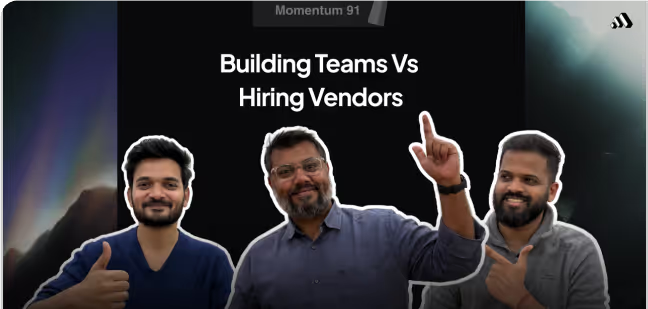
Reports
Data-backed perspectives on where industries are headed, giving you the foresight to make bolder moves.
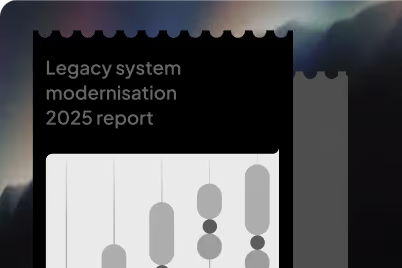
Newsletter
A quick catch-up with ideas, wins, and tips worth stealing, straight to your inbox every week.
.avif)
Podcasts
Conversations where you get to know everything from the ones who know it best.
.avif)
Your Offshore Development Center, Done Right
Access top-tier global talent, enterprise infrastructure, and complete regulatory compliance through our proven model.
Start Now




